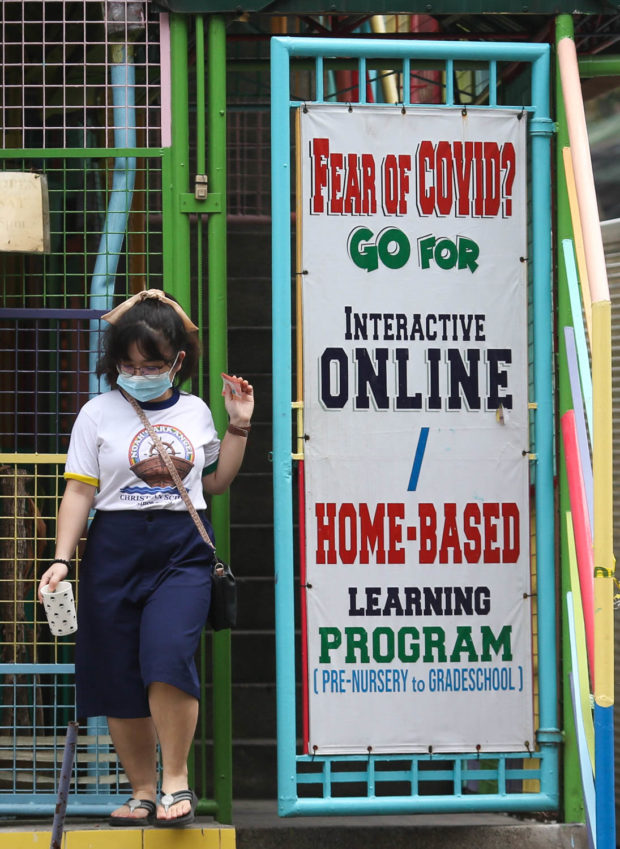Duterte OKs limited in-person classes for 2-month testing in more than 100 schools

SEE YOU SOON Voices of teachers and their pupils will once again fill classrooms in more than 100 schools around the country as the Department of Education resumes limited in-person classes in areas considered as low risk for COVID-19. —LYN RILLON
MANILA, Philippines — After more than a year of school closure, President Rodrigo Duterte has given the go-ahead for a two-month pilot testing of limited in-person classes for elementary and high school students in areas with low risk for COVID-19, Malacañang announced on Monday.
Presidential spokesperson Harry Roque said the decision was based on the need to return students to the classroom because of the detrimental effects of keeping them confined at home.
“It is not just an issue of education, it is also an issue of health, the mental health of the youth,” Roque said in a press briefing.
He said Mr. Duterte was not opposed to the idea of limited in-person classes as long as these would be held in areas with a low number of COVID-19 cases and have the support of local governments and parents.
“This is a small step back toward the life we knew before the pandemic,” he said.
The Department of Education (DepEd) has yet to set the date for the start of the pilot classes, but Education Secretary Leonor Briones said in the Palace briefing that the program would be implemented soon.
Limited hours
She said the limited in-person classes would be conducted in 100 public and 20 private schools and involve students in kindergarten, Grades 1 to 3 and senior high school.
The areas where the classes would be held must pass the safety assessment of the DepEd and local governments must also permit the holding of classes, while parents must provide written consent allowing their children to return to school, Briones said.
The schools must likewise meet the requirements of the Department of Health and the Inter-Agency Task Force for the Management of Emerging Infectious Diseases to ensure the proper enforcement of health protocols.
Their facilities must allow for physical distancing, have running water for hand-washing and be close to health-care facilities.
Officials would also keep an eye on the risk assessment of the areas, Briones said. “If there are changes in the risk assessment, then we will really stop [the classes].”
The classroom sessions for the pilot program would be held every other week, which means there would still be blended learning.
The number of students per classroom would likewise be limited to ensure space for proper distancing.
The kindergarten class size would be limited to 12 students, while Grades 1 to 3 classes would have a maximum of 16 students.
Technical-vocational classes in senior high schools would be allowed to have only 20 students.
Classes would not last the whole day. Kindergarten to Grade 3 classes would be for a maximum of only three hours and four hours for senior high school students.
“In all countries, there are no daily, continuous face-to-face [classes]. These are properly scheduled and strictly monitored,” Briones said.
She also noted that teachers were ready for the pilot in-person classes since the idea had been under discussion for some time.
Children’s movements would be closely watched as well, she said.
“If this pilot is safe and it is effective, then we will gradually increase [its coverage],” Briones said.
Briones said teachers and school staff would not be required to be vaccinated against COVID-19 in respect of their rights since vaccination was not mandatory in the country.
“Teachers and staff 65 years old and below who have no comorbidities could participate in the program and serve regardless of their vaccination status,” she said.
However, the chair of the Senate basic education committee on Monday said that while he welcomed the planned dry run of in-person classes in schools, the move should go hand in hand with teachers and learners getting inoculated against COVID-19.
Sen. Sherwin Gatchalian said the government should take steps to assure parents that their children would remain safe by vaccinating teachers and school staff and immediately launching the vaccination rollout for school-age children below 18.
Mixed reactions
But Briones noted that a significant number of teachers had already been vaccinated, and the DepEd had been encouraging educators to sign up for inoculation with their local governments.
The Alliance of Concerned Teachers (ACT) welcomed the approval of the pilot implementation of in-person classes, a move which the group said was a significant step to advancing the education system amid the pandemic.
“[This] is direly needed amid grave learning loss and inaccessibility of distance learning to the youth who mostly belong to impoverished families,” ACT said on Monday.
It urged the government to ensure that health facilities are installed in schools, including sufficient toilets, hand-washing facilities and clinics.
Health and sanitation personnel should also be present and health checks and mass testing must be administered to all participating learners and workers, it said.
Meanwhile, the Teachers’ Dignity Coalition on Monday said that given the rising number of COVID-19 cases and a burdened health-care system in the country, it was untimely and dangerous to conduct in-person classes for now.
“The government has not yet fixed the COVID response and the record of more than 20,000 cases almost every day in the past week can attest to that … so if the in-person classes will push through, it is like they are risking the safety of the people, especially the children,” the group said.
Prior to the President’s latest directive, in-person classes were allowed only for college students taking health-related degree programs.
The Philippines is one of the last two countries in the world to reopen schools since the pandemic began in March 2020. The other country, Venezuela, is reopening face-to-face classes in October. INQ